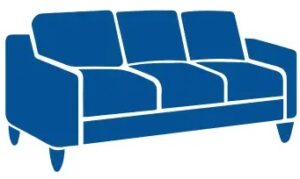POPs Waste and How to Dispose Of It
First off – What exactly are POPs?
Persistent Organic Pollutants (POPs) pose significant threats to human health and the environment. This is because of their long-lasting nature and ability to spread through air, water, and wildlife. POPs waste includes items such as upholstered domestic seating, and electrical devices containing chemicals such as polychlorinated biphenyls (PCBs) and dioxins.
Due to the harmful effects of these materials, it is hardly surprising that strict regulations now exist around POPs. New regulations introduced by the Environment Agency in January 2023 mandate the safe storage and disposal of POPs waste. Both homes and businesses are required to comply with the regulations which cover the management, removal, and disposal of this waste. And it’s important to note that disposal of POPs waste in landfill sites is strictly prohibited.
Where do you find POPs?
POPs are toxic substances that remain in the environment for extended periods, negatively impacting wildlife and human health because they can transfer through air and water, affecting various species through the food chain. Common examples of POPs include PCBs, DDT, and dioxins, often used in industrial and agricultural processes.





POPs waste encompasses various items found in homes and businesses. These include upholstered seating and electrical devices. Upholstered seating, such as sofas and office chairs, may contain POPs in components like foam and fabric. Electrical items like printers and cables may also contain PCBs.
Disposing POPs Waste
The regulation of POPs waste in the UK involves incineration to prevent the release of harmful chemicals into the environment. The Persistent Organic Pollutants Regulations 2007 mandate the destruction of POPs waste to protect the environment and prevent adverse impacts on the food chain.
To dispose of POPs waste properly, it must be stored separately from other waste to prevent contamination. Materials containing POPs can be identified through documentation, testing, or lab analysis. Proper disposal involves incineration in authorised facilities, as recycling and reuse methods are not suitable for POPs waste.
Households can dispose of POPs waste at local household waste recycling centres. Businesses on the other hand must arrange commercial waste collection by registered carriers.
As outlined here, adhering to regulations for the management and disposal of POPs waste is essential to protect the environment and human health from harmful effects of persistent organic pollutants.
If you believe you have materials containing POPs please get in touch with our team to discuss how we can help you.
Telephone : 01865 570882



 Back to blog
Back to blog